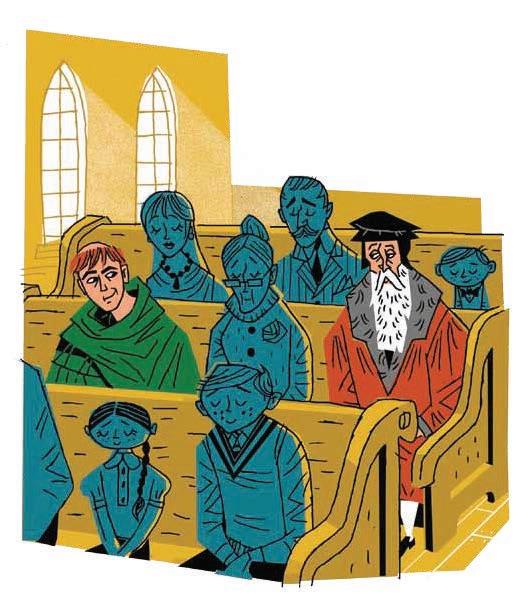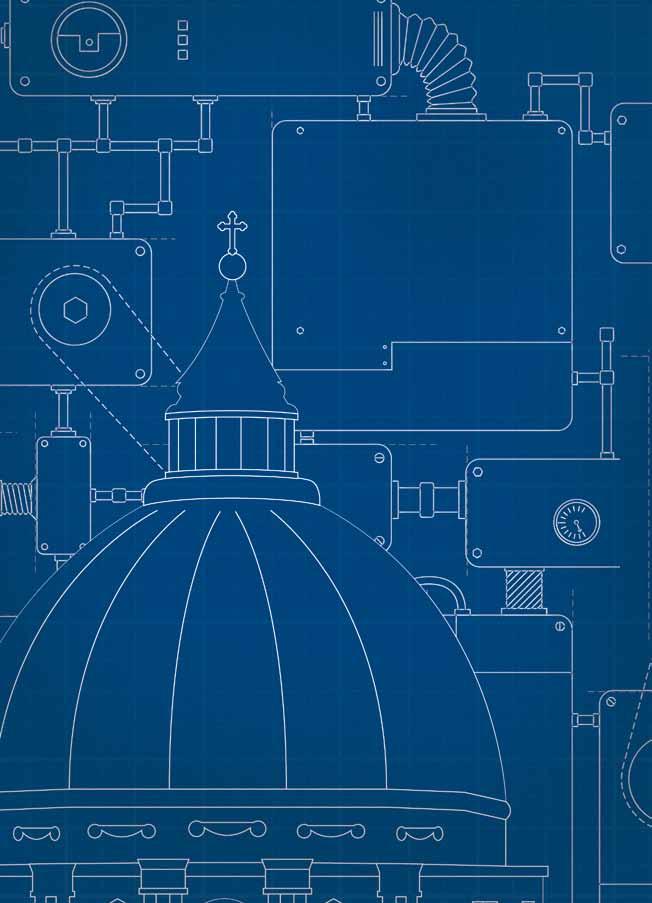
12 minute read
Who's in Charge Here? The Illusions of Church Infallibility





WHO’S IN CHARGE HERE


T H E I LLUSIONS O F C HURCH I NFALLIBILITY
by MICHAEL S. HORTON

IN MY E XPERIENC E WITH T HOS E W HO WRESTLE WITH C ONVERSION T O ROM AN C ATH O LICISM— A T LEAST T H O S E WHO HAV E P RO FESSED FAITH I N THE G OSPEL—THE DR IV I N G THEO L OGICAL ISSU E I S A UT HO RITY. HOW C AN I BE CERTAIN THAT WHAT I BELIEV E I S T RU E ?
The gospel of free grace through the justification of sinners in Christ alone moves to the backseat. Instead of the horse, it becomes the cart. Adjustments are made in their understanding of the gospel after accepting Rome’s arguments against sola scriptura. I address these remarks to friends struggling with that issue.
Reformation Christians can agree with Augustine when he said that he would never have known the truth of God’s Word apart from the catholic church. As the minister of salvation, the church is the context and means through which we come to faith and are kept in the faith to the end. When Philip found an Ethiopian treasury secretary returning from Jerusalem reading Isaiah 53, he inquired, “Do you understand what you are reading?” “How can I,” the o±cial replied, “unless someone guides me?” (Acts 8:30–31). Explaining the passage in the light of its fulfillment in Christ, Philip baptized the man, who then “went on his way rejoicing” (v. 39).
Philip did not have to be infallible; he had only to communicate the infallible Word with su±cient truth and clarity.
For many, this kind of certainty, based on a text, is not adequate. We have to know—really know— that what we believe is an infallible interpretation of an ultimate authority. The churches of the Reformation confess that even though some passages are more difficult to understand than others, the basic narratives, doctrines, and commands of 28
Scripture—especially the message of Christ as that unfolds from Genesis to Revelation—is so clearly evident that even the unlearned can grasp it.
For the Reformers, sola scriptura did not mean that the church and its o±cial summaries of Scripture (creeds, confessions, catechisms, and decisions in wider assemblies) had no authority. Rather, it meant that their ministerial authority was dependent entirely on the magisterial authority of Scripture. Scripture is the master; the church is the minister (for helpful definitions, see page 30).
THREE THES ES ON SOLA SCRIPTURA
The following theses summarize some of the issues people should wrestle with before embracing a Roman Catholic perspective on authority.
1.
The Reformers did not separate sola scriptura (by Scripture alone) from solo Christo (Christ alone), sola gratia (by grace alone), and sola fide (through faith alone). As Herman Bavinck said, “Faith in Scripture rises or falls with faith in Christ.” Revealed from heaven, the gospel message itself (Christ as the central content of Scripture) is as much the basis for the Bible’s authority as the fact that it comes from the Father through the inspiration of the Spirit. Jesus Christ, raised on the third day, certified his
2.
3.
divine authority. Furthermore, he credited the Old Testament writings as “Scripture,” equating the words of the prophets with the very word of God himself, and commissioned his apostles to speak authoritatively in his name. Their words are his words; those who receive them also receive the Son and the Father. So Scripture is the authoritative Word of God because it comes from the unerring Father, concerning the Son, in the power of the Spirit. Neither the authority of the Bible nor that of the church can stand apart from the truth of Christ as he is clothed in his gospel.
Every covenant is contained in a canon (like a constitution). The biblical canon is the norm for the history of God’s saving purposes in Christ under the old and new covenants. The Old Testament canon closed with the end of the prophetic era, so that Jesus could mark a sharp division between Scripture and the traditions of the rabbis (Mark 7:8). The New Testament canon was closed at the end of the apostolic era, so that even during that era the apostle Paul could warn the Corinthians against the “super-apostles” by urging, “Do not go beyond what is written” (1 Cor. 4:6). While the apostles were living, the churches were to “maintain the traditions even as I delivered them to you” (1 Cor. 11:2), “either by our spoken word or by our letter” (2 Thess. 2:15). There were indeed written and unwritten traditions in the apostolic church, but only those that eventually found their way by the Spirit’s guidance into the New Testament are now for us the apostolic canon. The apostles (extraordinary ministers) laid the foundation, and after them workers (ordinary ministers) built on that foundation (1 Cor. 3:10). The apostles could appeal to their own eyewitness, the direct and immediate vocation given to them by Christ, while they instructed ordinary pastors (like Timothy) to deliver to others what they had received from the apostles.
Just as the extraordinary o±ce of prophets and apostles is qualitatively distinct from that of ordinary ministers, the constitution (Scripture) is qualitatively distinct from the Spirit-illumined but non-inspired courts (tradition) that interpret it. Again, therefore, Scripture is magisterial in its authority, while the church’s tradition of interpretation is ministerial.
To accept these three theses is to embrace sola scriptura as the Reformation understood it.
RECEIVING THE WORD
This is precisely the view we find in the church fathers. First, it is clear enough from their descriptions (e.g., the account in Eusebius) that the fathers did not create the canon but received and acknowledged it. (Even Peter acknowledged Paul’s writings as “Scripture” in 2 Peter 3:16, even though Paul clearly says in Galatians that he did not receive his gospel from or seek first the approval of any of the apostles, since he received it directly from Christ.) The criterion they followed indicates this: To be recognized as “Scripture,” a purported book had to be well attested as coming from the apostolic circle. Those texts that already had the widest and earliest acceptance in public worship were easily recognized by the time Athanasius drew up the first list of all seventy-seven New Testament books in A.D. 367. Even before this date, many of these books were being quoted as normative Scripture by Clement of Rome, Origen, Irenaeus, Tertullian, and others. Of his list, Athanasius said that “holy Scripture is of all things most sufficient for us.” 1 Also in the fourth century, Basil of Caesarea instructed, “Believe those things which are written; the things which are not written, seek not. It is a manifest defection from the faith, a proof of arrogance, either to reject anything of what is written, or to introduce anything that is not.” 2
Second, although the fathers also acknowledged tradition as a ministerially authoritative interpreter, they consistently yielded ultimate obedience to Scripture. For example, Augustine explained that the Nicene Creed was binding because it summarizes the clear teaching of Scripture. 3
THE DEBATE WITH R OM E
Roman Catholic scholars acknowledge that the early Christian community in Rome was not
unified under a single head. Paul, for example, reNevertheless, building on the claims of fifth-cenminded Timothy of the gift he was given when the tury Roman bishops Leo I and Galsius, later bishops presbytery laid its hands on him in his ordination of Rome did claim precisely this “proud address.” (1 Tim. 4:14). In fact, in the Roman Catholic-AngliDeclaring themselves as Christ’s replacement on can dialogue, the Vatican acknowledged that “the earth, they claimed sovereignty (“plenitude of powNew Testament texts oer no su±cient basis for er”) over the world “to govern the earthly and heavpapal primacy” and that they contain “no explicenly kingdoms.” At the Council of Reims (1049) the it record of a transmission of Peter’s leadership.” 4 Latin Church claimed for the pope the title “ponSo one has to accept papal authority exclusively tifex universalis“—precisely the title identified by on the basis of subsequent post-apostolic claims Gregory as identifying one who “in his self-exalof the Roman bishop, without scriptural warrant. tation [is] Antichrist’s precursor.” Is Gregory the However, there is no historical succession from Great correct, or are his successors? Peter to the bishops of Rome. Though inspired by God, Scrip
As Jerome observed in the ture cannot be sufficient. It is a fourth century, “Before attachdark, obscure, and mysterious book ment to persons in religion was (rendered more so by Rome’s albegun at the instigation of the legorizing exegesis). An infallible devil, the churches were governed by the common consultation of KNOW WHAT canon needs an infallible interpreter. This has been Rome’s argument. the elders.” Jerome goes so far as to suggest that the introduction of YOU BELIEVE The insu±ciency of Scripture rests on its lack of clarity. It is true that bishops as a separate order above the Bible is a collection of texts the presbyters was “more from custom than from the truth of an arrangement by the Lord.” 5 InterT he churches of the Reformation make the followspread across many centuries, brimming with a variety of histories, poetry, doctrines, apocalypestingly, even Pope Benedict XVI ing distinction in explaintic literature, and laws; however, acknowledges that presbyter and ing the di erence between wherever it has been translated in episcipos were used interchangethe Bible’s authority and the vernacular and disseminated ably in the New Testament and in the church’s, as well as widely, barely literate people have the earliest churches. 6 the relationship between been able to understand its central
Ancient Christian leaders of Bible and church: message. Contrast this with the lithe East gave special honor to the braries full of decretals and enbishop of Rome, but they considMagisterial Authority cyclicals, councilor decisions and ered any claim of one bishop’s suScripture is the final, ulticounter-decisions, bulls and prompremacy to be an act of schism. mate, and inerrant guide ulgations. Any student of church Even in the West such a privilege in matters of faith and life. history recognizes that, in this case, was rejected by Gregory the Great Scripture as Master. the teacher is often far more obin the sixth century. He expressed scure than the text. It’s no wonder offense at being addressed by a Ministerial Authority Rome defines faith as fides implicbishop as “universal pope”: “a The church’s summaita: taking the church’s word for it. word of proud address that I have ries of Scripture (i.e., the For Rome, faith is not trust in Jeforbidden.…None of my predeceschurch’s creeds, confessus Christ according to the gospel, sors ever wished to use this prosions, catechisms, and but yielding assent and obedience fane word [‘universal’].…But I say decisions) have a penulunreservedly simply to everything it confidently, because whoever timate, derivative, and falthe church teaches as necessary to calls himself ‘universal bishop’ lible—though nonetheless salvation. There are many hazards or wishes to be so called, is in his valid—authority from God. associated with embracing aninself-exaltation Antichrist’s preThe church as minister. fallible text without an infallible cursor, for in his swaggering he interpreter. However, the altersets himself before the rest.” 7 native is not greater certainty and

clarity about the subject matter, but a sacrifice of the intellect and an abandonment of one’s personal responsibility for one’s commitments to the decisions and acts of others.
SCRIPTURE ALONE IS SUFFICIENT
Those of us who remain Reformed must examine the Scriptures and the relevant arguments before concluding that Rome’s claims are not justified and its teaching is at variance with crucial biblical doctrines. A Protestant friend in the midst of being swayed by Rome’s arguments exclaims, “That’s exactly why I can’t be a Protestant anymore. Without an infallible magisterium everyone believes whatever he chooses.” At this point, it’s important to distinguish between a radical individualism (believing whatever one chooses) and a personal commitment in view of one’s ultimate authority. My friend may be under the illusion that his decision is dierent from that, but it’s not. In the very act of making the decision to transfer ultimate authority from Scripture to the magisterium, he is weighing various biblical passages and theological arguments. The goal (shifting the burden of responsibility from oneself to the church) is contradicted by the method. At this point, one cannot simply surrender to a Reformed church or a Roman church; one must make a decision after careful personal study. We’re both in the same shoes. Most crucially, Rome’s ambitious claims are tested by its faithfulness to the gospel. If an apostle could pronounce his anathema on anyone—including himself or an angel from heaven—who taught a gospel dierent from the one he brought to them (Gal. 1:8–9), then surely any minister or church body after the apostles is under that threat. First, Paul was not assuming that the true church is beyond the possibility of error. Second, he placed himself under the authority of that Word.
The frustration Reformation Christians have with the state of contemporary Protestantism is understandable. I feel it every day. Yet those who imagine that they will escape the struggle between the “already” and the “not yet,” the certainty of a promise and the certainty of possession, the infallibility of God’s Word and the fallibility of its appointed teachers, are bound to be disappointed wherever they land. As Calvin counseled on the matter, Scripture alone is indeed su±cient: “Better to limp along this path than to dash with all speed outside it.”
Michael S. Horton is editor-in-chief of Modern Reformation.
1 From “Athanasius: Select Works and Letters,” in Nicene and Post-Nicene
Fathers, ed. Alexander Roberts et al, 2nd ser. (Peabody, MA: Hendrickson, 1994), 4:23. 2 “On the Holy Spirit” from “Basil: Letters and Select Works,” Nicene and
Post-Nicene Fathers, 8:41. 3 Augustine, “On the Nicene Creed: A Sermon to the Catechumens,” 1. 4 From Unity Faith and Order - Dialogues - Anglican Roman Catholic Authority in the Church II (Anglican/Roman Catholic Joint Preparatory Commission), paragraph 2, 6. 5 Cited in the Second Helvetic Confession, ch. 18. 6 Joseph Cardinal Ratzinger, Called to Communion: Understanding the
Church Today (San Francisco: Ignatius Press, 1996), 122–23. 7 From “Gregory I: Letters,” in Nicene and Post-Nicene Fathers, 1:75–76; 2:166, 169, 170–71, 179, 222, 225.





